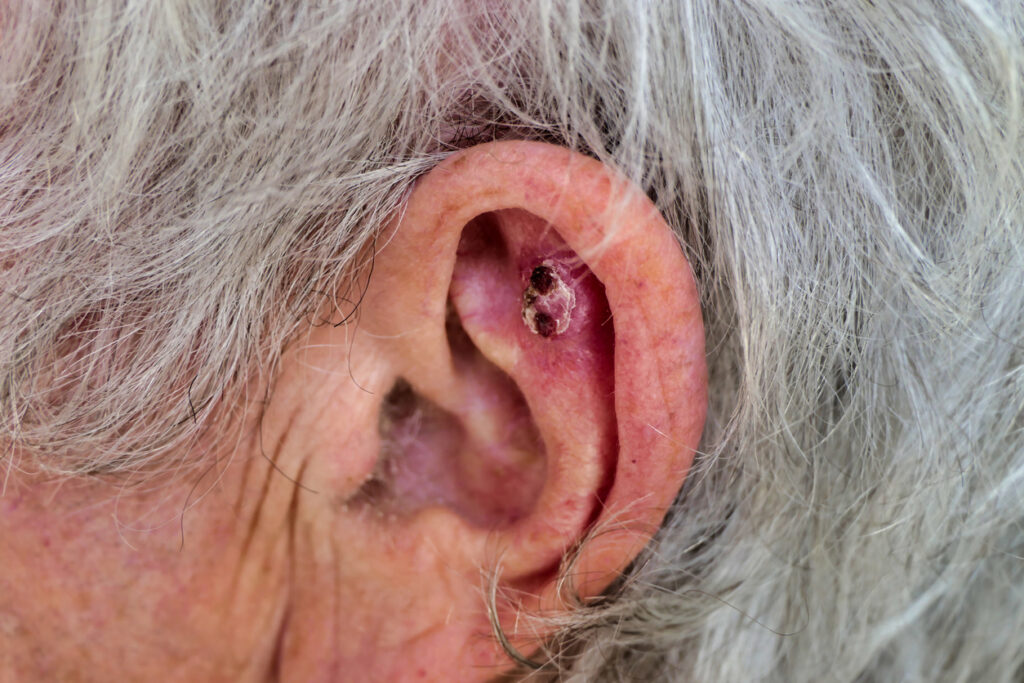The combination of avelumab (Bavencio,EMD Serono) and cetuximab (Erbitux, Lilly) improved progression-free survival (PFS) compared to avelumab alone in patients with advanced cutaneous squamous cell carcinoma (cSCC), according to a Phase 2 clinical trial led by the Alliance for Clinical Trials in Oncology.
The results were presented as an oral abstract at the 2025 American Society of Clinical Oncology (ASCO) Annual Meeting in Chicago, IL, and published in the Journal of Clinical Oncology.
Meaningful Clinical Benefit
“These results show that combining immune checkpoint inhibition targeting the PD-1: PD-L1 pathway with avelumab plus EGFR-targeted IgG1 monoclonal antibody cetuximab can provide meaningful clinical benefit compared to avelumab alone for patients with advanced cSCC,” says Dan Zandberg, MD, Principal Investigator and Director of Head and Neck and Thyroid Cancer Disease Sections at UPMC Hillman Cancer Center in Pittsburgh, PA, in a news release. “It opens the door to future research and new strategies for improving outcomes in this difficult disease.”
Approved immune checkpoint inhibitors, cemiplimab and pembrolizumab have advanced the cSCC treatment landscape, but many patients still experience disease progression. Preclinical research suggests that combining blockade of the PD-1: PD-L1 pathway plus an IgG1 monoclonal antibody like cetuximab, which targets EGFR and activates innate immunity via antibody-dependent cellular cytotoxicity (ADCC), may create a synergistic effect.
The trial was designed to evaluate whether this dual mechanism could improve PFS. Patients were randomized to one of two groups: avelumab monotherapy every two weeks or combination of avelumab plus cetuximab, also given every two weeks. Patients progressing on avelumab alone were allowed to cross over to combination therapy, allowing for evaluation of efficacy in both frontline and immunotherapy refractory settings.
From 2019 to 2023, the study enrolled 60 patients with advanced cSCC in the United States; 57 were evaluable. The median age of participants was 72 years. The majority were white (96.5%), and male (91.2%), all patients were HIV-negative, and 75.4% expressed PD-L1. Most tumors (84.2%) originated in the head or neck region, and 47.1% of patients had distant metastases. Baseline characteristics were balanced across treatment groups, and the randomization was stratified by PD-L1 status.
Improved Primary Endpoint of PFS
The combination of avelumab and cetuximab significantly improved the primary endpoint of PFS compared to avelumab alone. The median PFS was 11.1 months in the avelumab plus cetuximab group compared to 3.0 months in the avelumab alone group, the study showed.
Nine patients in the avelumab monotherapy arm crossed over to the avelumab plus cetuximab group and the median PFS after crossover was 11.3 months. The median overall survival (OS) of the avelumab plus cetuximab group was not reached compared to the avelumab group which was 35.8 months. The confirmed objective response rate (ORR) was 27.6.% in the avelumab and cetuximab group and 21.4% in the avelumab alone group.
Side effects related to treatment occurred in 93% of patients who received avelumab plus cetuximab; and in 78.6% of those who received avelumab. More serious side effects (grade 3 or higher) were seen in 48.3% of patients receiving avelumab plus cetuximab, and in 21.5% of those receiving avelumab treatment. The most common serious side effects in the combination group were rash (20.7%) and infusion related reactions (20.7%). There were no deaths related to treatment or unexpected toxicity.


